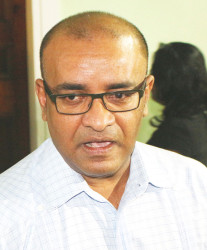Opposition leader Bharrat Jagdeo last night dismissed the proposed national budget as flawed and after promising a “fresh approach” in the way the opposition would conduct itself he led a walkout by opposition parliamentarians to virtually end the budget debate.
“Shame!” government members chanted repeatedly as the PPP/C MPs filed out of the parliamentary chamber at the conclusion of Jagdeo’s address and before the start of the presentation by Prime Minister Moses Nagamootoo.
Before leading the walkout, Jagdeo announced that the PPP/C members would not allow themselves to be victimised by the current government, which he accused of trying to contain him. Jagdeo and the PPP/C had cricitised the government for changing the speaking order, which traditionally saw the opposition leader being the penultimate speaker. He and the PPP/C also accused the government of trying to muzzle him by limiting the time allotted for his presentation to 45 minutes but he was officially allowed to speak for an hour, although his presentation lasted for over 90 minutes.

“They should’ve had one speaker after me, which is the tradition of the House. They are not going to take away our right. We are not going to allow that to happen. We just ended the debate, so I was last speaker, instead of the penultimate speaker,” Jagdeo told reporters in the corridors after the walkout.
The proposed $221 billion budget was presented under the theme, “A Fresh Approach to the Good Life in a Green Economy.”
During his presentation, Jagdeo fought the incessant heckling from the government side of the House to deliver an impassioned criticism of the budget, which he said was “flawed… vague and often vacuous” and would not stimulate growth.
The trained economist explained to the House that increases in Gross Domestic Product (GDP) occurs when there is an increase in private consumption, private investment, government spending and net exports. The present budget, he argued, only caters for increased government spending. “This budget operates on the flawed assumption that you can tackle economic development by only dealing with one element of the growth equation. It is a fallacy,” Jagdeo declared.
Addressing government claims that the economy has slowed down, Jagdeo said that when the world economy slows down, anti-cyclical measures, such as increased government spending on the Keynesian side or increased money supply or a combination of both, are put in place.
“He has done no such thing on the Keynesi an side and then he is talking about withdrawing government money held in private accounts,” he added, as he referred to a government decision to move about $30 billion in government funds out of private bank accounts and place it into the Consolidated Fund.
This action by the government, he charged, was decreasing money supply. “He is shrinking money supply—this is not anti-cyclical, this is pro-cyclical—you are going to drive the economy into further problems,” he told Finance Minister Winston Jordan.
“It does not respond to the concerns of the people. It doesn’t focus on those who are losing their jobs. It doesn’t focus on creating wealth. It focuses on redistribution of wealth,” Jagdeo said of the budget, before predicting that in “two or three years’ time [the economy] will flat-line.”
Jagdeo, who is a former Finance Minister, said real estate and motor vehicle sales have severely dropped as “people are holding on to their money because they are not getting the right signals from this government.”
“It’s a crisis of confidence; the minister has not tackled the key issues; he has it philosophically wrong,” Jagdeo stressed.
He further challenged comments made by the minister about tax remissions. “The minister spoke about the remissions being too high and being granted to friends and family of the PPP but he has not said if he is proposing a tax increase,” Jagdeo said.
He posited that a removal of tax remissions from the private sector “is in effect a tax increase,” which would negatively affect entities, such as Banks DIH and potential re-migrants.
As he neared the end of his presentation, the politician’s voice grew hoarse from battling the calls for him to stop speaking. Nonetheless, he also addressed what he considered irresponsible statements from the government.
“They have been claiming that we are bankrupt… they have backpedalled on that [but] do not underestimate what [happens] when you say something like that, what it means to the rest of the world. One little statement of that nature can have great consequences. This country is not bankrupt by any stretch of the imagination,” he declared.
“When investors hear you are bankrupt, they start to think, well, the government will raise taxes. If you are bankrupt, insurance companies start pushing their premiums up because they say this is a risky country; the cost of loans and interest rates go up,” Jagdeo warned.




